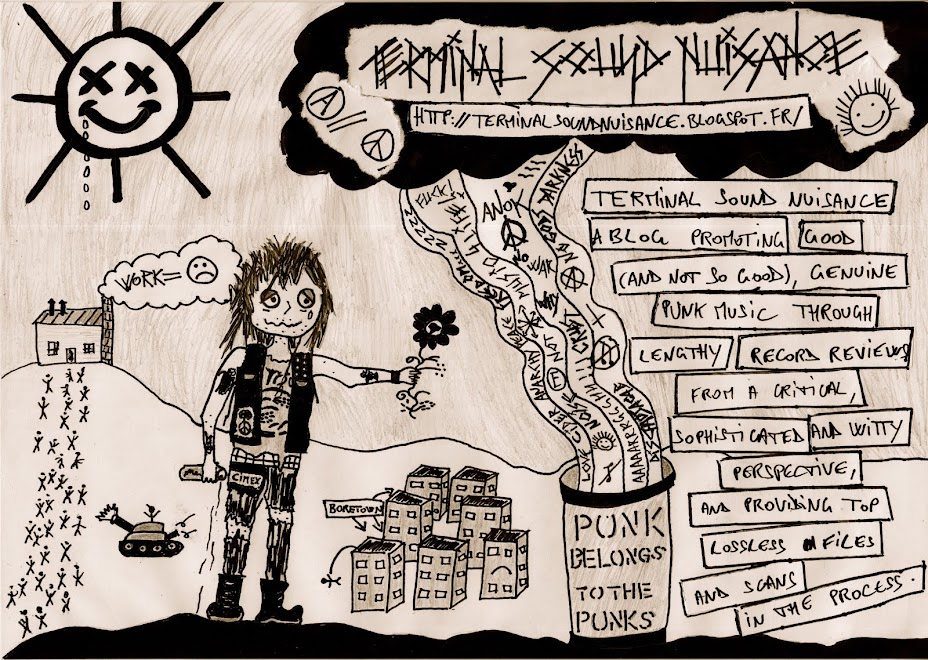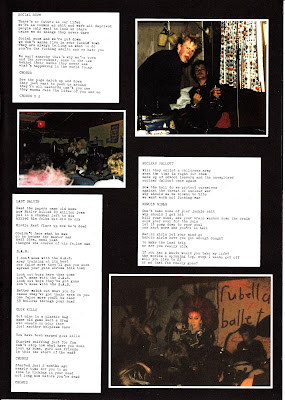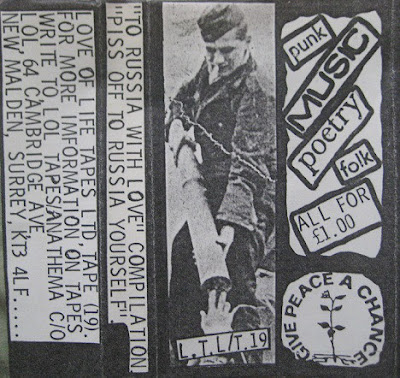Like every year, Bloody Christmas is coming again and government twats loudly claim - assuming there are still people caring for what they have to say - that, in this time of distress, the country needs to celebrate merrily while respecting health safety measures. Christmas remains some sort of odd and painful traditional duty with an almost patriotic touch in our current situation, as this year you don't have to kiss your right-wing brother-in-law or your ass-grabbing great-aunt. So the pandemic is not totally without benefit, although you will still have to endure your nephew running berserk around the table and turning the living room into a battlefield. Thanks fuck no one cares for notorious punk-repellent Mariah Carey in my family, it's like garlic to us. But am I only here to whine about Christmas Eve? No indeed. For the last Terminal Sound Nuisance post of 2021, I would like to make you a present in the shape of a lossless rip of a Chaos UK classic. It is not something you will be able to put at the foot of the plastic Christmas tree because it really is a download file but I suppose that if you actually download and open it on the 25th it can count as a valid present.
Who doesn't know Bristol's Chaos UK? And more importantly, who doesn't like Chaos UK? If you have people in your circle of friends who happen to dislike the band, then you are clearly hanging out with the wrong gang. There is no exception. Sort your life out. Chaos UK belong to this category of bands that everyone likes to some extent, or at least have a lot of respect for. I would include bands such as Discharge, The Mob or Subhumans in this category and many more but I don't want to spend time making lists of bands just to have a bitter geezer declare that, just for the sake of arguing on a monday, he never rated Why very highly nor enjoyed Mob 47. I love taking on that precise role but of course hate it when the situation is reversed. Human nature I guess. Chaos UK really are a bag of quality crisps. Some people have them on a daily basis, others just on the way home after a night-out, others on rare occasions because they want to be slim or eat healthily or whatever dieticians say, while there are also those that never allow themselves to eat crisps but secretly crave for them. Chaos UK work exactly like that. They have their devoted fans, freakish outcasts who can listen to live tapes from the mid-80's, and people who are fine with enjoying a bit of Burning Britain occasionally, on their grandmother's birthday for instance. I like to think that I belong to the first category, the one where the very best of heroes meet.
Claiming that I have a Chaos UK story to tell could be a little far-fetched. It's not like my mum revealed on my 15th birthday that she helped pen "No security" or something. But the band being something of a foundational, heuristic one for me in my teenage years, I inevitably remember well the first time I heard them and the context. It was in 1999. My school only had one real punk. There were also baggies-wearing "skatecore" types who were into Fat Wreck Chords and singers who sounded like ducks, and I know what I am talking about since I had a brief "skatecore" phase myself. But there was only one real punk. After meeting that one real punk, my life changed completely as I started to dress seriously with bleached trousers, boots and an oversized jacket with beer caps as badges. Proper class. I started to hang with the real punk and we became friends. She made real punk tapes for me with The Casualties and older British bands like Varukers, Abrasive Wheels, Cock Sparrer or GBH on it and my own conversion into a real punk was swift indeed, to the great disappointment of my parents who even started to miss my baggie trousers phase which is a saying a lot.
The school we went to had little equipment to speak of but there was a "radio club". The name might be a little misleading though. It was a simple room with a basic hi-fi system - it had a broken turntable and an Out of Order poster for some reason which made us feel like rebels - located just at the entrance of the refectory. We could use the room once a week but he music we played was not broadcast in the whole building of course, the school was not at this level of high technology. We just installed a chair before the door of the room where we placed the speakers and played the music as loud as possible to our fellow students queuing to get into the refectory. The radio show, if you can call it that, took place during lunch breaks so that many unsuspecting, unprepared and, in most cases, unwilling students got exposed to 90's streetpunk and oi - a large portion of which was pretty shite in retrospect - as well as a tasteful assortment of 80's British punk-rock. The speakers' wire would often be removed by lads who did not enjoy our impeccable punk taste but amazingly enough we never got physically brutalized or too victimized, in spite of us playing Casualties' "For the punx" and "Riot" every week. There were threats of mob violence, pitchforks and torches, but, for once, the gods of punk seemed to be protecting us. My mate was heavily into Chaos UK's "Farmyard boogie" a song which she would play often. I did not particularly enjoy the number, although I did pretend to because I wanted to look like I knew my shit. It is after all a rather long comedy song that is difficult to understand if you are not aware of West Country's rural accent but it was my first encounter with Chaos UK and listening to that song always takes me back to the days when I considered a tartan flat cap and oversized bleached pants to be crucial parts of my identity. My friend assured me that Chaos UK were the punkest band of all and more than 20 years later I can say that she was right to some extent.
The Chaos UK record my friend owned and off which she played "Farmyard boogie" was the 1998 Best of... Chaos UK cd. During a glorious weekend trip in London later that year I managed to find a copy of the very same cd in a record store which felt like a war medal. I had never actually heard the cd in its entirety, apart from "Farmyard boogie" that I knew by heart and "Kill your baby" because we tried to shock people with it, so that digesting the remaining 24 songs proved to be quite an experience. The selection is fine actually. You can find classic vintage Chaos UK numbers from their Riot City Years as well as songs from later records like The Morning After the Night Before (I can still along to "Little bastard with ease). Writing this review makes me realize that there is a lot of Chaos UK material from the 90's, basically the Chaos-as-singer era, that I am really not that familiar with and haven't played that much, but listening to the split Lp's with Raw Noise and Death Side while writing this piece shows me that I might have been - for once - wrong. Oh well, I shall correct the inconsistency. Let's get back to that "best of" cd, admittedly a terrible format but it was the late 90's so bear with me. On the whole, I really liked the record, the noisier hardcore songs as much as the singalong cider punk-rock ones. There was one track however that was truly horrendous and confused me to no end, a 1983 live version of "False prophets" take from Flogging the Horse. I have listened to many horrendous live recordings from the 80's since then, some of them deeply scarring, but this one may take the cake especially since it was released on a proper album by Anagram Records. As a teen, the song terrified me and the very first time I heard it I could not even make out what was happening. If you have never listened to that rubbish, give it a go if you think you are hard enough. It makes Confuse's 1984 live recording sound overproduced. It made Chaos UK even more extreme in my teenage eyes.
Alright, I digress as usual. For some reason, no song from Just Mere Slaves were included on the 1998 cd. Maybe it had to with not getting the original label's - Selfish - permission or maybe the curator just decided to leave the songs out (my guess as to why is as good as yours). As a result, I was unaware of the existence of Just Mere Slaves for quite a long time, until the explosion of music blogs in the late 00's. A real shame since Just Mere Slaves has become my favourite Chaos UK recording, along with the hardcore thrash masterpiece that is Short Sharp Shock Lp. I cannot claim to be a proper Chaos UK historian but let's have some basics right. At that time Mower was on vocals, Gabba had taken on guitar duties, Chaos was still on the bass guitar of course and Chuck on the drums (EDIT: although not being able to get into Japan because of a criminal record, Age, Lunatic Fringe's drummer, replaced Chuck on this Japanese tour). The studio side of Just Mere Slaves was recorded in Japan during the band's tour in November, 1985. Along with their fellow noise-making Bristolians Disorder, Chaos UK have been massively influential on Japanese punk music. In fact, it is widely argued that it was their impact on a certain section of the Japanese scene - let's say Confuse, 白 (Kuro) or Gai and their plentiful offspring, to be brief - that subsequently spawned a punk subgenre now called "noisepunk", a once confidential and obscure cult that has persisted in secret and which the internet has made accessible and very popular among the noise-inclined punks (the name was apparently coined by The Wankys but I feel the terminology is useful and meaningful enough to be liberally applied retroactively). So I suppose that the coming of noise heroes Chaos UK to Japan must have been a massive deal at that time and the shows cannot have been anything but short sharp shocks of punk chaos.
The four songs from the first side of Just Mere Slaves were recorded during that tour which probably means that they recorded the thing on November, 12th in Tokyo since they had a day-off. I imagine the band basically entering the studio, unleashing the fucking fury, getting pissed with local punks and being done with it in just one day. The brilliant result is highly impressive. The first time I listened to Just Mere Slaves I immediately thought that it did not quite sound like a typical mid-80's Bristol recording. Of course the songwriting, the raw snotty vocals, the demented atmosphere and the pissed-and-proud vibe were unmistakably mid-80's Chaos UK manic hardcore thrash (there is a new version of "4 minute warning" to help listeners know what they are dealing with) but the frontal layers of highly distorted guitar and the piercing feedback, the extremity of it all, had that Japanese punk texture. There is something of a Japanese hardcore energy to Just Mere Slaves. The four studio songs retain that Chaos UK essence, an energy-driven, hardened, primal and mad-sounding take on the UK82 but at the same time they sound like noizy, triumphant and hyperbolic Japanese hardcore. Were Chaos UK aware of the wave of Bristol-influenced Japanese bands? It would be mere conjecture but they must have been familiar with some Japanese hardcore through the tape-trading network so could it be that they actually decided to emulate or experiment with that Japanese distorted, blown-out sound? Or was it the engineer's idea? Both? Just an epic piss-up in the studio? In any case, this circulation and circularity of influences is fascinating indeed, from Bristol to Japan, from Japan to Bristol, and Chaos UK got to play with Japanese hardcore legends like Gauze, Outo, The Execute, Lip Cream, Goul and Gastank (that is what I deduce from the thank list on the backcover, there could have been more). The studio side of Just Mere Slaves included a crazy and lightning fast rerecording of "4 minute warning" and three new songs: the loud and aggressive one-minute long hardcore scorcher "Rise from the rubble" which they will rerecord for the Chipping Sodbury Bonfire Tapes 1989 album; "City of dreams" a mid-paced wonder with hypnotic tribal drums and demented vocals and feedback; and "Just mere slaves", a fast, anthemic and emphatic song which is actually not unlike epic and direct Japanese hardcore, especially on the introduction and some of the transitions.
I feel Just Mere Slaves is a crucial record, maybe not a masterpiece per se, but what is commonly called a minor classic. The energy and intensity level on the studio side is breathtaking and relentless. The blistering side might only be eight-minute long and make you crave for more but it does not get much better in terms of "noise ain't dead" UK punk. It was Chaos UK at their noisiest but I do think Short Sharp Shock sounded more threatening and savage and therefore groundbreaking. The other side of Just Mere Slaves is a live recording from their Osaka gig on November, 16th. The sound is surprisingly good considering the sonic chaos - it must have been taken directly from the mixing desk or something - and the daring listener will be exposed to nasty rendering of early Chaos UK classics, "Control", "Victimised", "No security", "Senseless conflict" and, of course, "Farmyard boogie", the Chaos UK song of my youth. This is punk-as-fuck as you can expect but still very much discernible (even the guitar solo is good) and enjoyable. Another live recording from the Japanese tour, from their opening Tokyo gig, can be listened to on the B side of the Stunned to Silence 1985 tape (my friend Erik from the always great Negative Insight wrote an article about this little-known tape that comes recommended, especially since everyone at the Negative Insight HQ soundly thinks that everybody loves Chaos UK). As hard to estimate as it might be, this short Chaos UK tour must have left a mark on the collective psyche of Japanese punks at the time. To this day, Chaos UK, along with Doom and of course Discharge, remain one of the most liked UK punk bands over there with still many bands working on their legacy so it is a safe bet to assume that Japanese punks really never stopped connecting with their music and attitude. And of course the band, Mower especially, helped consolidate the fashion of terminal crust pants and utility belt in Japan which are now only worn by the most elite crusties.
The record was originally released on Selfish Records in 1986, a label that put out far too many classic mid-late 80's Japanese hardcore records to mention. My copy is however a 1997 reissue (or is it actually a bootleg? It looks like one so you tell me) from Sewage Records, a short-lived that also released Varukers Ep's. Black Konflik Records from Malaysia reissued last year Just Mere Slaves on cd so support the scene and get it.
I would like to dedicate this writeup to my dear friend from school who I mentioned at the beginning and who tragically passed away in 2019. Without her, I would have never discovered real punk music and gigs. It changed my life forever and more than 20 years after, I am still grateful and feel quite lucky. So may you rest in peace, in punk, in power and let's farmyard boogie.





































